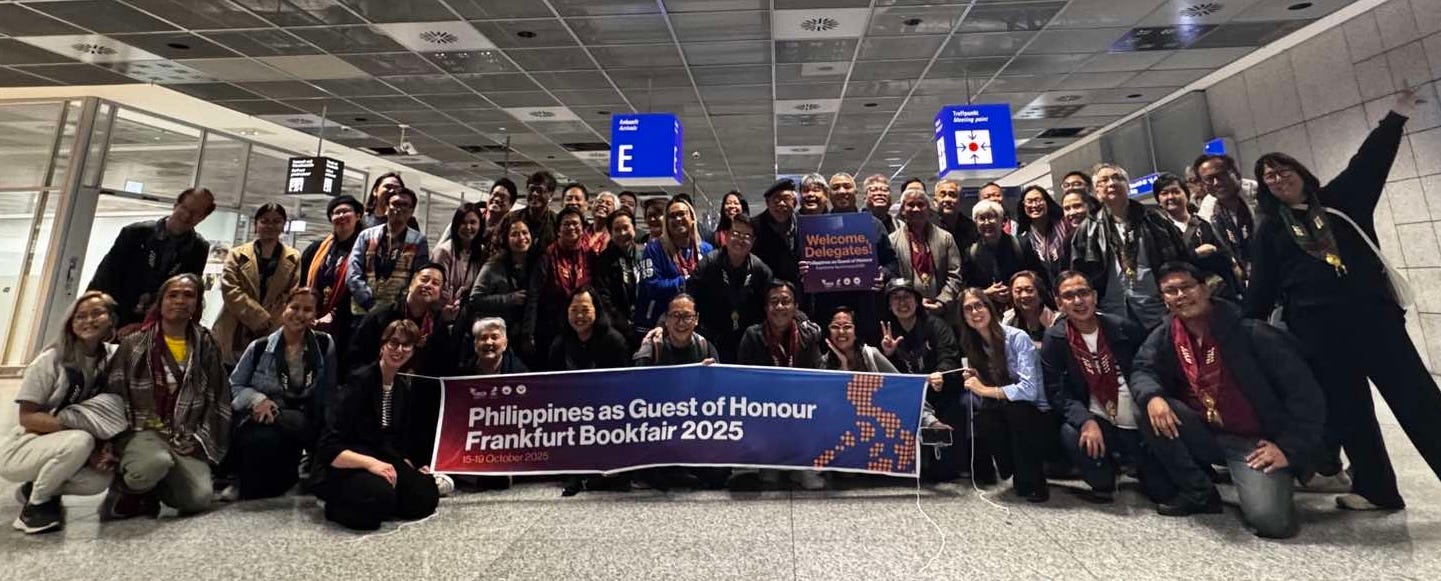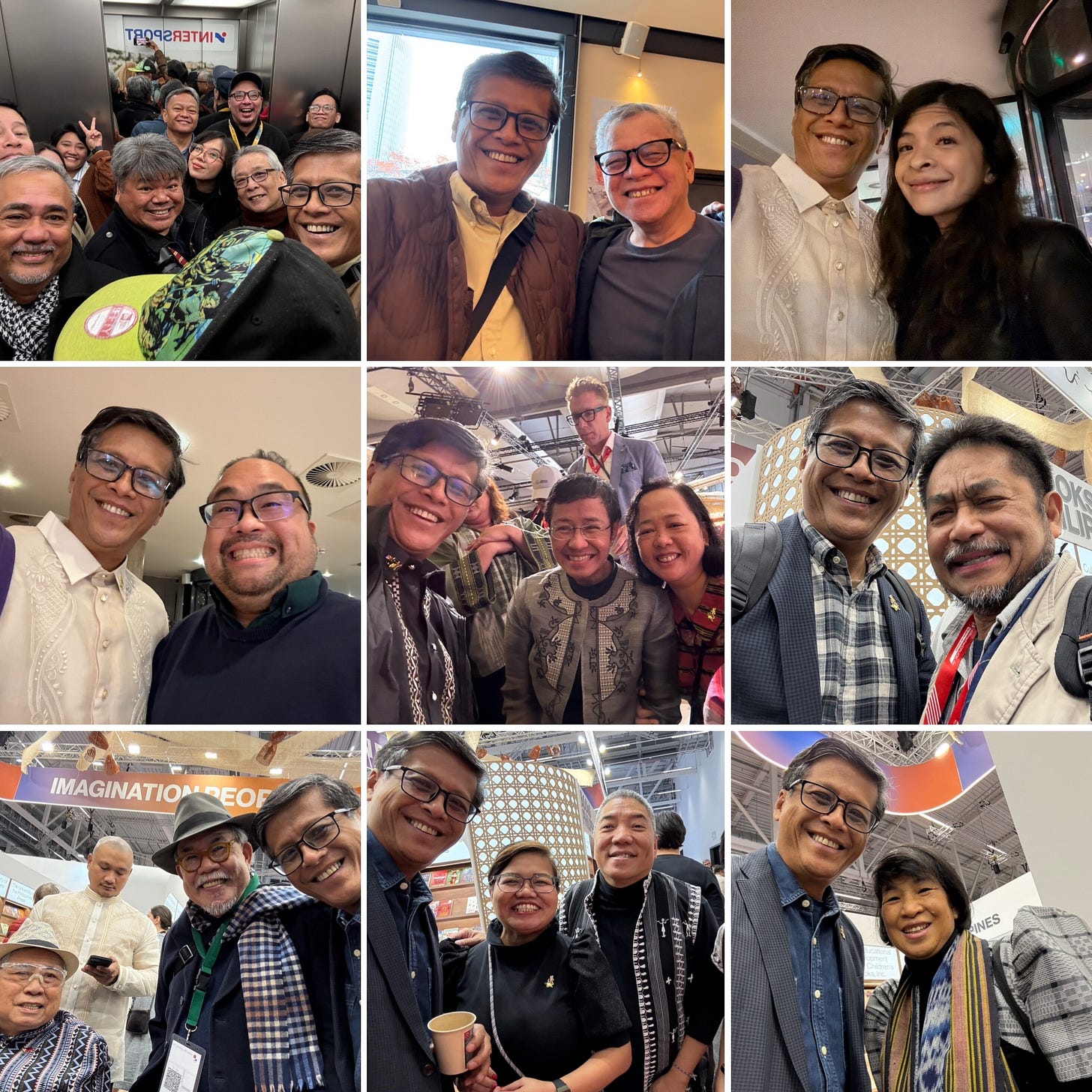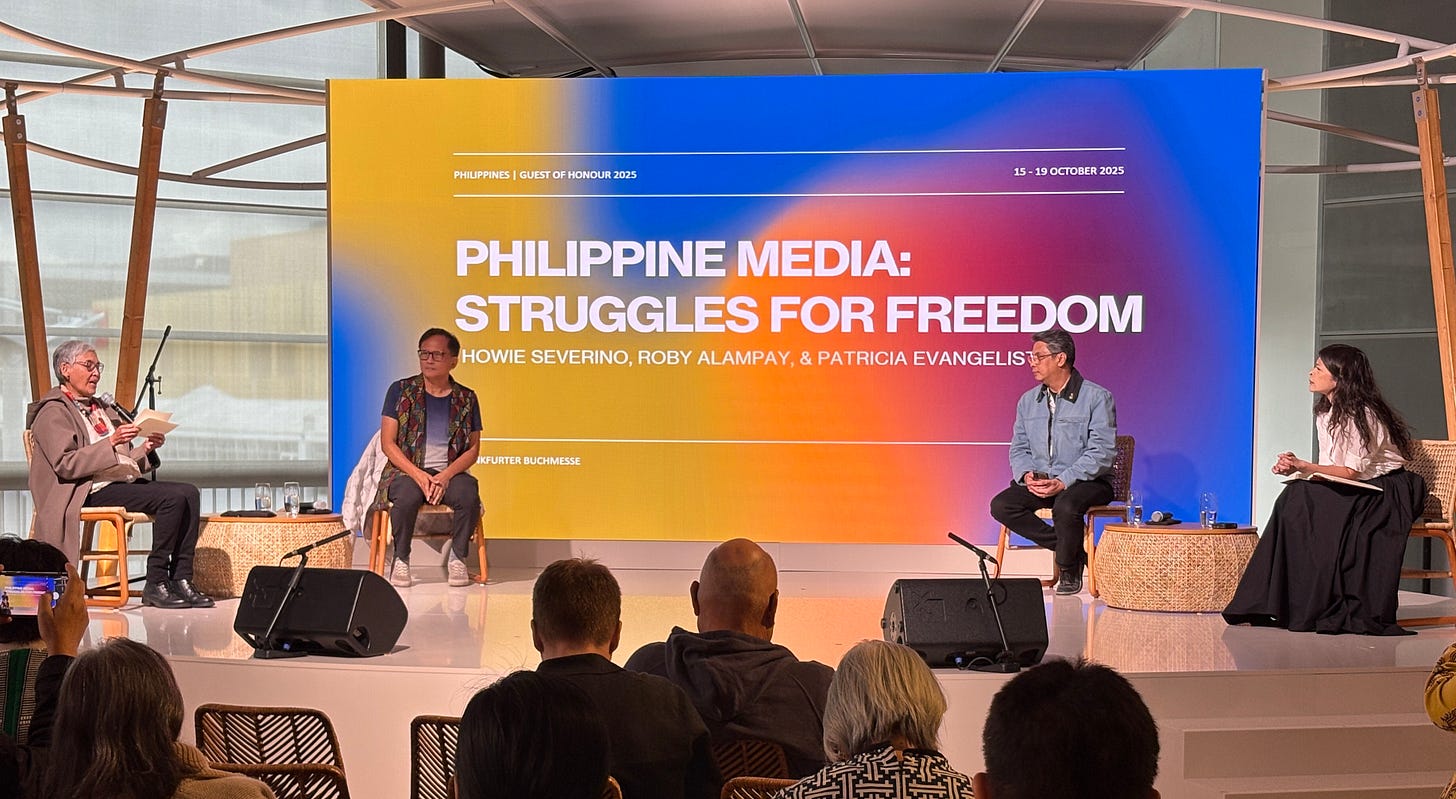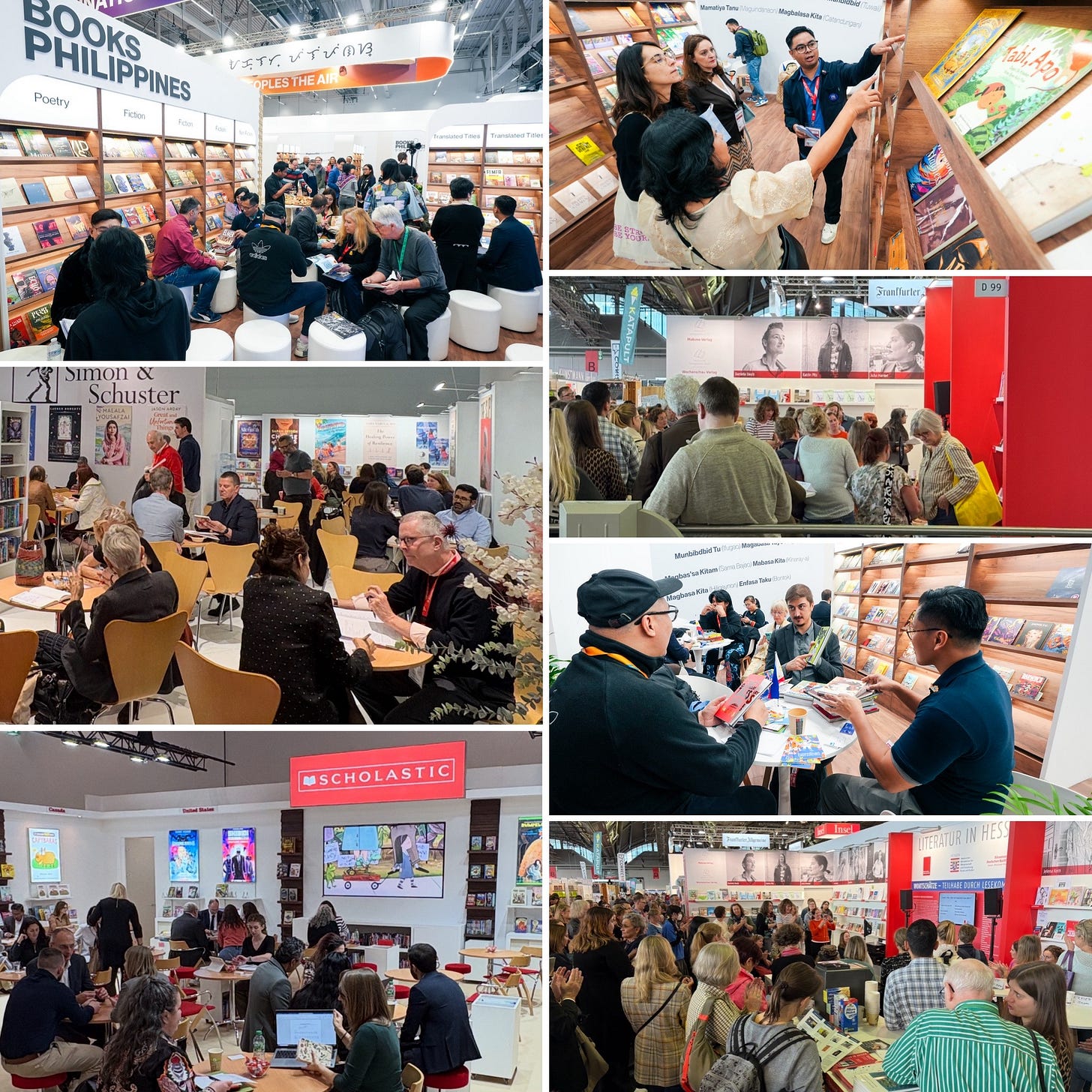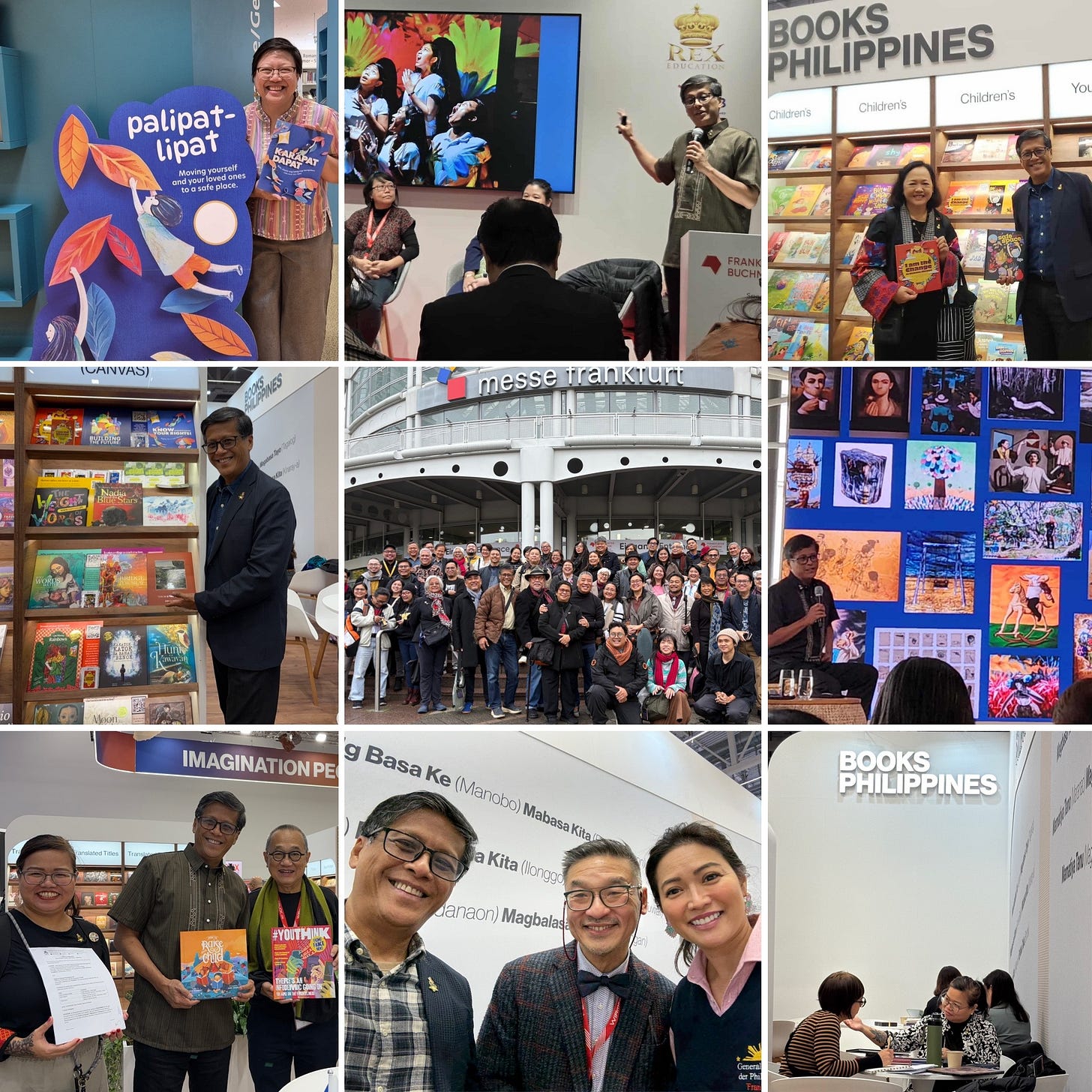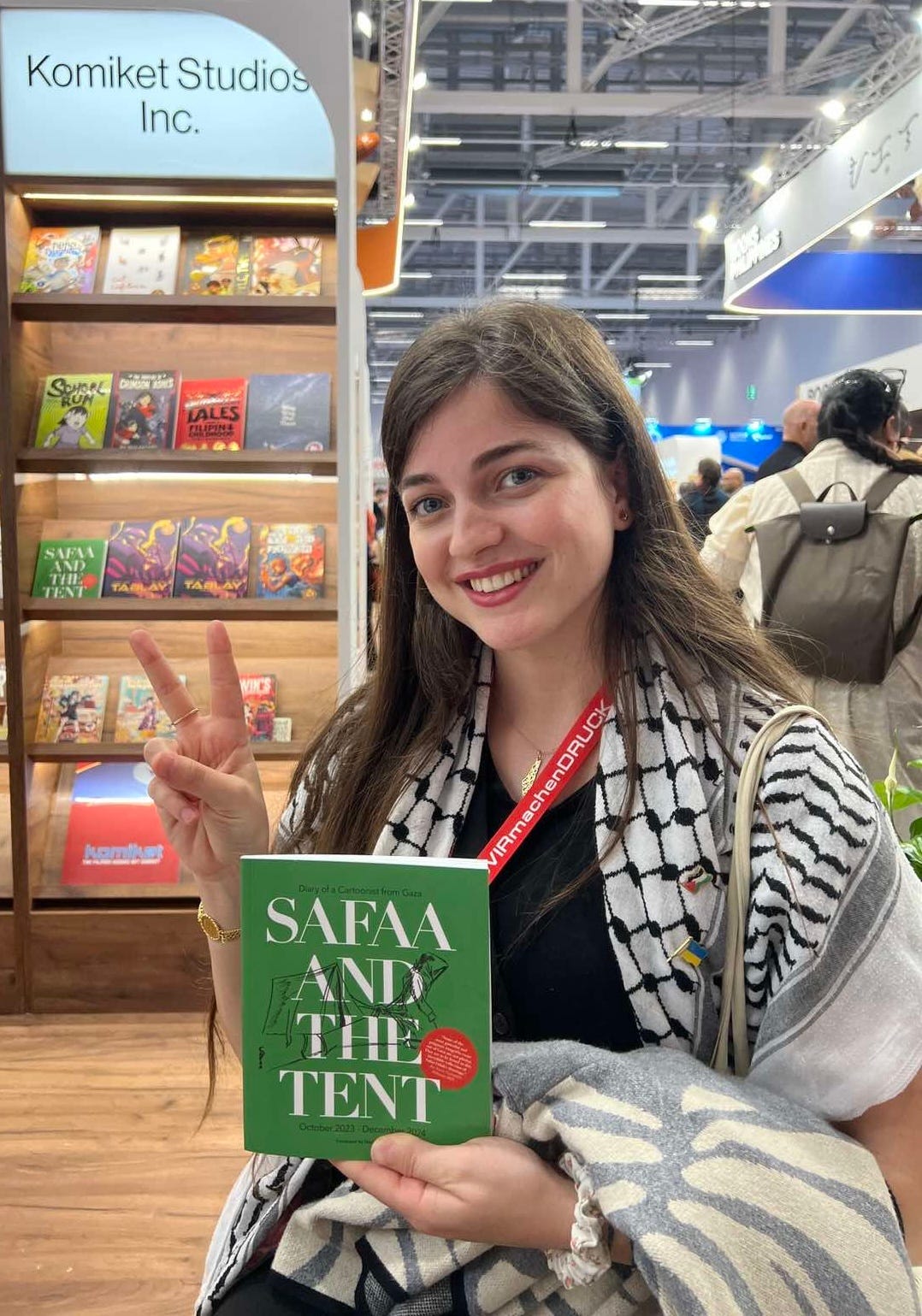I’ve just come from the Frankfurt Book Fair, where I had the honor and privilege of joining a select delegation of creatives to represent the country, as Guest of Honor, in the world’s biggest gathering of literary publishers.
I’ve never been around so many wildly accomplished literary and artistic minds all in one place — each driven not just by talent, but by a deep desire to show the Philippines in its best light. For most of the fair, we stayed in the same hotel, sharing meals and moments with creatives we previously may have only admired from afar.
We soaked in the packed, at times overwhelming, but undeniably impressive program organized by the National Book Development Board — a surreal rollercoaster of pride and emotion.
One moment, you’re listening to an incredibly passionate and articulate panel talk of the dangers faced by journalists and artists in times of extrajudicial killings and genocide.
The next, you’re hopping to the bold rhythms of Moro Beats, or being moved to tears by the soaring voices of the Philippine Madrigal Singers.
And throughout it all — this was, after all, a business-to-business event — you could not escape the hum of activity. Around every corner, you could literally see it: deals were being pitched, chased, and signed.
We still need to make a full accounting, but there’s no doubt in my mind: the Philippines’ presence at Frankfurt was a resounding success. More importantly — especially given the larger context — for those of us who were there, it was the right call: a cultural and commercial investment that mattered. It mattered because it didn’t just showcase our books, art, and voices. It created a powerful space to make our stand for human rights, and to stand in solidarity with struggling peoples everywhere.
Because as huge as the fair was, we couldn’t ignore the larger issues looming over it. I’ve written before about the strong, legitimate, and deeply understandable call to boycott the event in solidarity with Palestine and to protest the genocide being carried out by Israel, with the complicity of the United States and Germany.
I’ve also written about why, despite this, we chose to attend. I am perfectly comfortable with our decision — not only because I know our record speaks for itself — but also because I can accept that in a moment this imperfect, no response can ever be perfect.
And, from what I saw in my own (possibly echo-chambered) social media circle, Filipino creatives — whether they supported the boycott or chose to attend — mostly approached each other with mutual respect. We understand that we can disagree, and still share the same moral ground.
Sadly, it appears that it is not so with everyone.
There is a fine line between offering legitimate critique of someone’s political choices, and lobbing arrogant condemnations from a self-righteous perch that only sees the world in black and white. The first is necessary, even healthy. The second — usually echoing around insular corners of social media where outrage gets turbocharged — does nothing but divide communities and feed egos.
And for not a few of us coming down from the emotional high of the Book Fair, it’s that second kind of response they’ve come home to. To them, the community feels fractured — even hostile and unsafe — thanks to a loud, toxic minority that refuses (or simply can’t be bothered) to understand that people respond to injustice in different ways. That there is more than one way to stand in solidarity with the oppressed, especially with the Palestinian people, and that we can walk different paths and still fight for the same cause.
Now, I am not one to cancel anyone, nor am I afraid of being cancelled myself. But life’s too short, so I have no problem simply ignoring such unreasonable folks.
But before it gets to that, to them I would offer the wisdom and words of Zoya Miari, a Palestinian-Ukrainian (!) Peace Ambassador who’s lived through two wars and been a refugee twice over. She came to the Frankfurt Book Fair not knowing what she’d find. And she found the Philippine Pavilion.
She wrote:
I arrived with no big expectations, just curiosity. Yet I left deeply inspired, by the many voices, stories, and experiences that reminded me of the power of words.
I learned about José Rizal, who liberated his people through words, writings that freed the minds of Filipinos and, in doing so, helped liberate his country from colonial powers.
It reminded me that words hold the power to decolonise, to free us spiritually, mentally, and collectively.
And when we free ourselves within, we move closer toward collective liberation for all.
After the Fair, she wrote a letter that was then sent to several members of our delegation, one clearly meant to be shared.
I’m on my way from Frankfurt back to Zurich, and I’m filled with so much love that I can’t stop thinking about the love I felt in the Philippine Pavilion.
I came back today to the Pavilion to say goodbye, not to a specific person, but to the whole community. This space became a safe space for me, one where I deeply felt a sense of belonging.
I’m writing these words to thank you and your people for creating a space where I, where we, felt heard and seen. That in itself is such a powerful impact. I know some people decided to stay in the Philippines to show support for the Palestinians, and I want to say that I hear and see them, and I thank them. And to those who decided to come, to resist by existing, by speaking up, by showing up, by connecting the dots, by being present & by sharing stories, I also hear you, see you, and deeply thank you.
We all share the same intention: to stand for justice, to fight against injustice, and we’re all doing it in the best way we know how. I truly believe that the first step to changing the world is to create safe spaces where people are deeply heard and seen.
When stories are heard and seen, we begin to share our vulnerabilities and showing that side of ourselves is an act of love. Through this collectiveness, this solidarity, we fight for collective liberation. I couldn’t stop talking about the Filipinos these past two days, and I know I will carry these moments with me forever. I promise that because of what you all brought, because of kind people like you, we will continue to resist until our people are free, until we all are free.
Thank you for reminding us of the power of community.
This is what we need, and this is what we all long for.
The Filipino presence at this year’s Book Fair has been my greatest source of hope, and because of this hope, I will continue to fight for collective liberation.
I found my home with you all.
So, maybe that’s the most important thing that we brought to Frankfurt: sanctuary.
Not everyone of us went. We could not all go and speak with one voice. And that’s fine. By going (and not going) I hope that as a people, we were heard in all our complexity. To me, the experience reaffirmed my belief that our culture, at its very best, has room for many voices, many approaches, and many ways of standing up.


